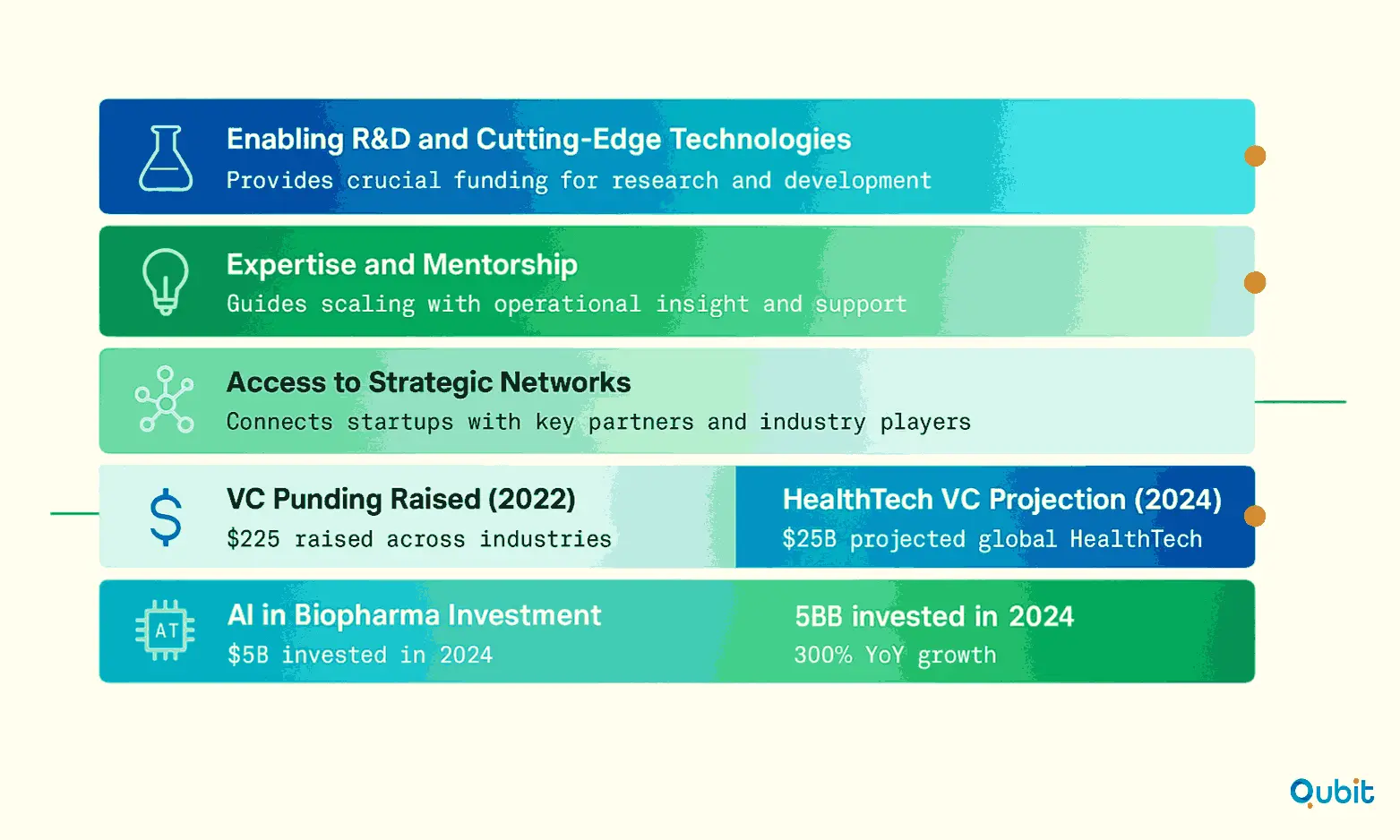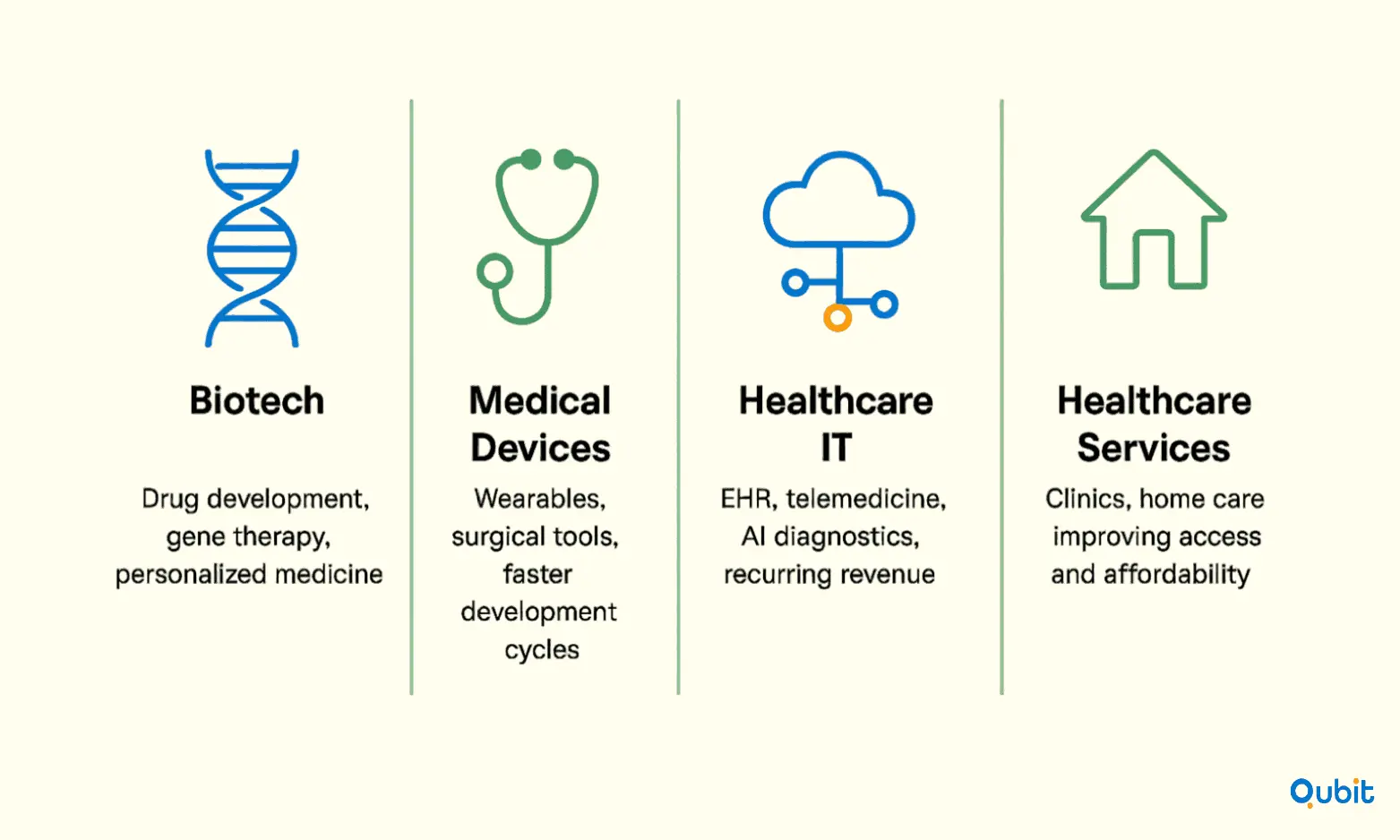The intersection of venture capital in healthcare and HealthTech innovation is reshaping the future of medical technology. As investors increasingly recognize the transformative potential of HealthTech startups, funding opportunities have expanded, offering both financial backing and strategic guidance. This dynamic environment is particularly appealing to entrepreneurs aiming to address critical healthcare challenges through technology-driven solutions.
Your discussion of venture capital nuances is complemented by the insights in how to secure funding for healthcare startups, which outlines a broader spectrum of funding methods. Understanding the role of venture capital in healthcare is essential for startups seeking to scale their operations and make a meaningful impact.
This article explores how venture capital fuels HealthTech startups, providing insights into funding trends, investor expectations, and strategic growth opportunities. Let’s jump right in.
Venture Capital in Healthcare: Driving Innovation in HealthTech
Venture capital plays a pivotal role in transforming the healthcare industry, particularly through its support for HealthTech startups. By providing not only financial backing but also strategic expertise, venture capital firms empower early-stage companies to develop groundbreaking solutions. This dual role is essential in addressing the complex challenges of modern healthcare.

How Venture Capital Fuels HealthTech Innovation
The infusion of venture capital into healthcare startups enables innovation on multiple fronts. First, it provides the necessary funding for research and development, allowing startups to focus on creating cutting-edge technologies. Second, venture capitalists bring invaluable expertise and mentorship, guiding startups through the intricacies of scaling their operations. Finally, these firms offer access to strategic networks, connecting startups with key industry players and potential partners.
The numbers underscore this impact. In 2022, venture capital funds raised nearly $22 billion, a testament to the sustained interest in fostering innovation across industries. Healthcare, in particular, has seen a surge in investments, with global venture capital funding for HealthTech companies projected to reach $25 billion in 2024. This growth reflects the increasing demand for digital health solutions and advanced technologies.
Emerging Trends in HealthTech Investments
HealthTech investments are evolving rapidly, with certain sectors gaining significant traction. One notable trend is the rise of artificial intelligence (AI) in biopharma. In 2024 alone, $5 billion was funneled into AI-driven biopharma solutions, marking a 300% increase from the previous year. This surge highlights the growing confidence in AI’s potential to revolutionize drug discovery and personalized medicine.
Strategic Advantages for Startups
Venture capital provides more than just funding, it equips startups with the tools to thrive in a competitive landscape. By offering mentorship, operational guidance, and access to a robust network, venture capitalists help startups navigate regulatory hurdles and market complexities. For those exploring alternative funding avenues, our analysis of crowdfunding healthtech startups complements this perspective, showcasing additional options for securing capital.
As the healthcare sector continues to evolve, venture capital remains a cornerstone of innovation, driving advancements that benefit both startups and the broader industry.
Types of Healthcare Companies VCs Invest In
Venture capitalists (VCs) strategically focus on healthcare sectors that promise innovation and scalability. Their investments span diverse areas, including biotech, medical devices, healthcare IT, and healthcare services, each offering distinct opportunities and challenges.

Biotech Investments
Biotech startups are a cornerstone of VC portfolios due to their potential for groundbreaking advancements in medicine. These companies often focus on drug development, gene therapy, and personalized medicine. However, the high costs of research and lengthy approval processes can pose significant hurdles. VCs are drawn to biotech firms with strong intellectual property, robust clinical trial data, and scalable solutions that address unmet medical needs.
Medical Devices
Medical device companies attract VCs by offering tangible products that improve patient care. From wearable health monitors to advanced surgical tools, these startups often have shorter development cycles compared to biotech firms. The challenge lies in navigating regulatory approvals and ensuring market adoption. VCs prioritize startups with innovative designs, proven efficacy, and clear pathways to commercialization.
Healthcare IT
The digital transformation of healthcare has made healthcare IT startups a prime target for VC funding. These companies focus on solutions like electronic health records (EHR), telemedicine platforms, and AI-driven diagnostics. The opportunities in this segment include scalability and recurring revenue models. However, challenges such as data security and integration with existing systems require careful consideration. Your understanding is deepened by the analysis in angel investment healthtech, which explains the role of individual investors in early-stage funding.
Healthcare Services
Healthcare service startups, including clinics, home care providers, and specialized treatment centers, offer VCs opportunities to invest in scalable business models. These companies often address gaps in accessibility and affordability. While operational challenges like staffing and compliance can be daunting, VCs are drawn to service providers with innovative approaches to delivering care and strong market demand.
Each of these healthcare segments presents unique dynamics, requiring VCs to carefully evaluate risks and rewards. By targeting areas with high growth potential and addressing critical industry challenges, VCs play a pivotal role in shaping the future of healthcare innovation.
6 Venture Capital Firms Investing in Healthcare
The healthcare sector is witnessing a transformative wave of innovation, fueled by venture capital firms that are actively investing in groundbreaking HealthTech solutions. These firms play a pivotal role in supporting startups at various growth stages, from early seed funding to later-stage investments. Below, we profile six prominent VC firms in healthcare, highlighting their unique strategies and contributions to the industry.
1. Felicis Ventures: A Focus on Disruptive HealthTech
Felicis Ventures stands out for its commitment to backing startups that challenge traditional healthcare models. With a portfolio that spans multiple industries, the firm has a strong emphasis on HealthTech innovation. Their investments often target companies at the intersection of technology and healthcare, driving advancements in telemedicine, diagnostics, and patient-centric platforms. For more details, visit the Felicis Ventures official website.
2. Andreessen Horowitz: Scaling HealthTech Giants
Andreessen Horowitz, also known as a16z, is renowned for its strategic investments in high-growth HealthTech companies. The firm provides not only capital but also operational expertise, helping startups scale rapidly. Their focus extends across various healthcare domains, including biotechnology, digital health, and medical devices. By fostering innovation, Andreessen Horowitz has become a key player in shaping the future of healthcare.
3. General Catalyst: Supporting End-to-End Healthcare Solutions
General Catalyst is a venture capital firm that prioritizes investments in companies aiming to revolutionize healthcare delivery. Their portfolio includes startups that integrate technology to improve patient outcomes and streamline care processes. A notable example is their support for platforms offering comprehensive, end-to-end healthcare solutions, which address multiple conditions and enhance accessibility.
4. Sequoia Capital: Early-Stage HealthTech Investments
Sequoia Capital is a leader in early-stage funding, with a keen interest in HealthTech startups. The firm’s investments often focus on companies developing innovative solutions in areas such as telehealth, personalized medicine, and AI-driven diagnostics. By providing seed funding and mentorship, Sequoia Capital helps startups lay the foundation for long-term success.
5. Bessemer Venture Partners: Bridging Technology and Healthcare
Bessemer Venture Partners has a strong track record of investing in HealthTech companies that bridge the gap between technology and healthcare. Their portfolio includes startups leveraging data analytics, machine learning, and cloud computing to address critical challenges in the healthcare system. This approach enables them to support companies that are not only innovative but also scalable.
6. Oak HC/FT: Driving Growth in Digital Health
Oak HC/FT specializes in growth-stage investments, with a particular focus on digital health. The firm’s strategy involves identifying companies with proven business models and helping them expand their reach. Their investments often target startups that enhance healthcare accessibility and affordability, making a tangible impact on patient care.
Case Study: Ro’s Growth Journey
A prime example of how venture capital can accelerate HealthTech innovation is Ro’s journey. Ro, a health platform offering accessible telehealth treatment, has scaled its services to cover 25 conditions through multiple venture capital rounds. This demonstrates how strategic financing partnerships can support rapid scaling in HealthTech.
For startups looking to scale through later-stage funding, the examination of scaling strategies gains further depth when considered with series a funding healthtech, presenting methods involved in later-stage investment rounds.
These venture capital firms are not only funding innovation but also shaping the future of healthcare by supporting transformative ideas at every stage of growth.
Partner With VCs Investing In The Future of Healthcare with Visible
Visible is transforming how healthcare startups connect with venture capital firms. By offering a specialized platform, it simplifies the fundraising journey for entrepreneurs, ensuring their innovative ideas reach the right investors. With its focus on venture capital in healthcare, Visible provides a tailored approach to match startups with investors who understand their unique challenges and opportunities.
The platform acts as a bridge, closing the gap between groundbreaking healthcare solutions and the funding needed to scale them. Through its curated database, startups can connect with healthcare-focused VCs, ensuring that their vision aligns with the expertise and resources of potential investors. This targeted matchmaking not only saves time but also increases the likelihood of long-term success.
For startups exploring alternative funding strategies, Visible complements traditional routes by offering direct healthcare investor connections. Whether you're in the early stages of development or looking to expand, the platform ensures your fundraising efforts are streamlined and effective.
If you're considering other approaches to growth, explore insights on bootstrapping healthtech startup strategies. This resource provides valuable perspectives for those aiming to build self-sustained ventures.
What Founders Should Know
- Regional specialization matters: Tailor your fundraising strategy to the strengths and focus areas of local and international funds
- Demonstrate clinical validation, regulatory readiness, and clear commercialization paths to attract later-stage investors.
- Highlight AI integration and real-world impact in your pitch—these are the most attractive themes for 2025 VCs.
- Prepare for rigorous due diligence as investors are prioritizing lower-risk, capital-efficient opportunities.
Startups often face challenges in understanding how to approach these firms effectively. An additional dimension surfaces in how to invest in healthtech industry, offering an investor-centric view that complements the broader funding narrative.
Conclusion
Targeted investment and strategic guidance are essential for HealthTech startups aiming to thrive in the competitive healthcare industry. Throughout this blog, we’ve explored how understanding the dynamics of venture capital in healthcare can empower startups to achieve sustainable growth. By aligning their innovative solutions with the right investors, these startups can unlock opportunities that drive both technological advancements and improved patient outcomes.
If you’re looking to align innovation with investor priorities, at Qubit we understand milestones, diligence readiness, and portfolio fit. Strengthen your round through our healthcare fundraising assistance services and connect with our team today.
Key Takeaways
- AI investments in healthcare are surging with significant ROI potential.
- Clinical decision support systems face unique maturation challenges.
- Predictive analytics are essential for early detection of patient deterioration.
- Investor interest is driving growth in both clinical and non-clinical AI solutions.
- Ongoing education and events are crucial for fostering industry collaboration.
Frequently asked Questions
What is healthtech venture capital?
Healthtech venture capital refers to investment funds that focus on supporting startups in the healthcare technology sector. These investments typically target innovations in areas such as biotechnology, digital health platforms, and medical devices, aiming to drive advancements in patient care and healthcare delivery.






